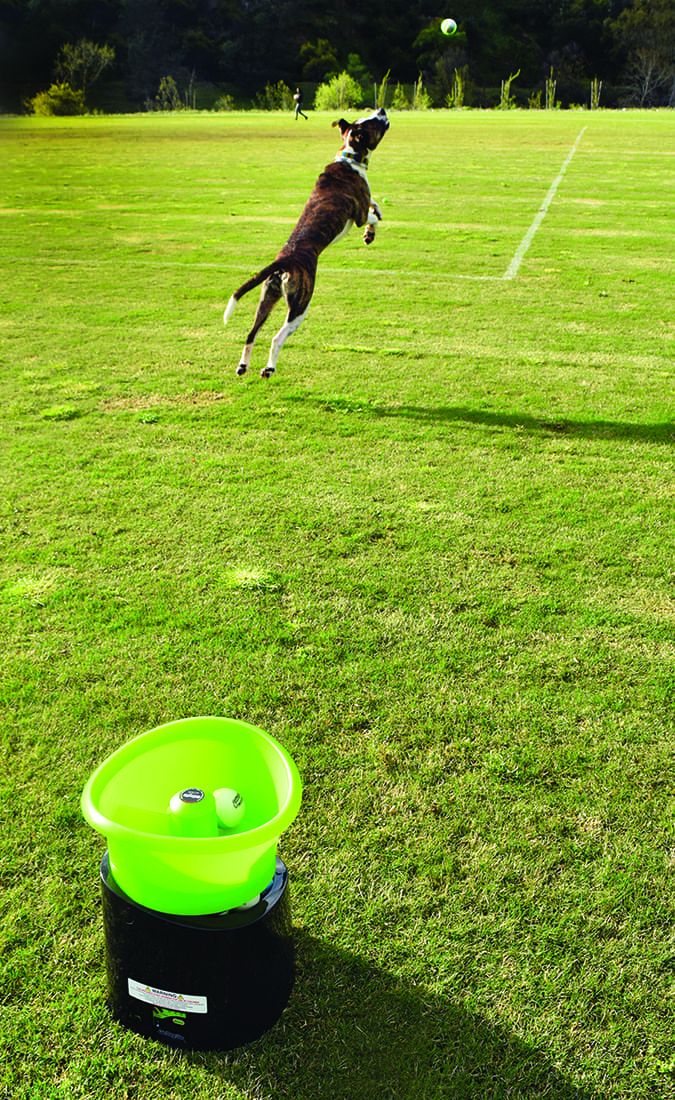Raise your hand if a bum shoulder keeps you from throwing a ball (or throwing a ball very far) for your dog. Actually, maybe just nod instead; if you’re like me, even raising your hand can hurt your shoulder on some days! If you nodded, you – and especially your fetch-crazy dog – are in luck! There are a number of automatic ball launchers and other tools that can throw your dog’s ball for you with absolutely no shoulder action required.
Whole Dog Journal is reader-supported. If you purchase through links on our site we may earn a commission. Whole Dog Journal does not accept money for its food and product reviews.
Automatic Ball Throwers Tested
We purchased the three most popular automatic ball launcers that will shoot out tennis balls, and have been flinging balls all over town to compare the features of these expensive machines. Your dog can play fetch all by himself with each of these products – that is, after you set one up, turn it on, and have taught him to drop his ball into the hopper that each product has positioned on the top. We tested three big-ticket automatic ball thrower machines:
Each of the products had unique and useful features not shared by the others, so while we definitely developed our own preferences among the toys, you may have different needs and preferences that would make other products rise to the top of your list of favorites. If we were buying just one, however, knowing about the differences ahead of time would have definitely guided our purchase to one of the machines and one of these automatic ball throwers over the others. We will describe each of the products so you can make your own choice!
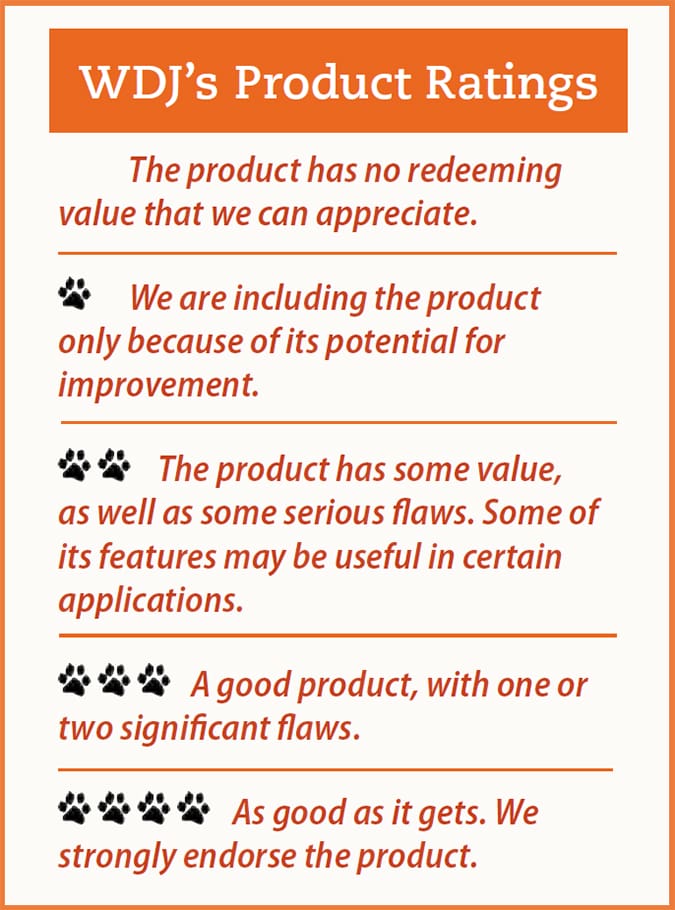
Automatic Ball Throwers Compared
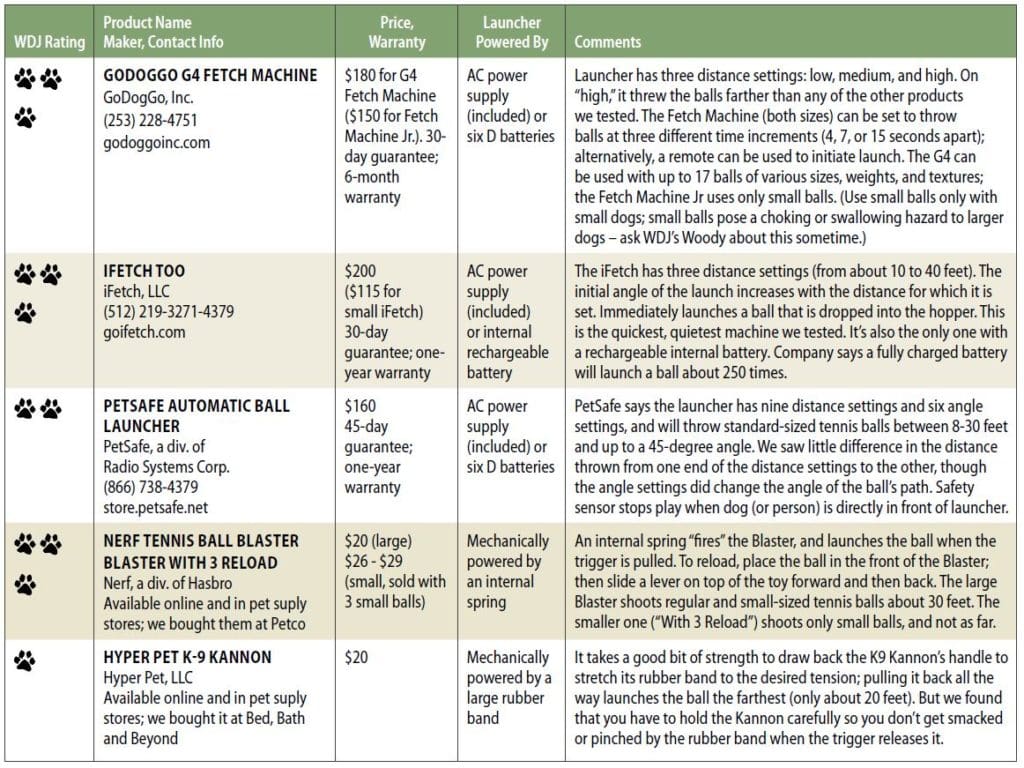
Our top pick: GoDogGo’s Fetch Machine
The owners of GoDogGo say they invented the very first automatic ball-launching machine in 1999. They have produced and improved the patented GoDogGo Fetch Machine (which appears in the photo above) ever since.
The Fetch Machine model we tested can launch as many as 17 standard-size tennis balls (it can actually hold more, but the company recommends loading it with a maximum of 17, as more balls may cause the chute to jam). It can throw standard-sized tennis balls and mini tennis balls. The Fetch Machine Jr. accommodates only small balls, 1.5 inches to 2.25 inches in diameter. Both machines can be used while plugged into an AC outlet, or powered with six D batteries.
We didn’t test the Jr., but, to the delight of our dogs, the G4 launched balls farther than any of the products we tried.
The machines can be set to launch with a variably timed delay, or to launch when you press a button on a remote control (included with the machine). Neither of the other machines we reviewed have varying launch delays or a remote-controlled launch. Also, this machine is the only one that allows you to load up the bucket/hopper with a bunch of balls.
Whether you use the timed delay or the remote control to launch a ball, the machine takes a few seconds to prepare the launch, and makes a gears-moving noise that helps the dog (and operator!) know exactly when the ball is going to get thrown out. Our test dogs quickly figured it out and started to run as soon as they heard the noise that indicated a launch was imminent.
Playing with a full hopper of balls is a little chaotic but fun, especially if you have multiple dogs running around and you are just encouraging playful exercise. If you want to maintain a nice, clean retrieve, though, you really want to play with just one ball, because even with the longest interval between the timed launches, there are moments when the dog is still bringing back one ball when another is launched. Every time this happened, our test dogs always dropped the ball they were retrieving and went for the most recently launched one – not a big deal for us, but you may not like that.
If you teach your dog to drop a ball into the hopper, he can play fetch by himself. Set the delay time (4, 7, or 15 seconds); then the machine will launch the ball approximately that many seconds after the ball is dropped into the hopper.
GoDogGo Fetch Machine Safety features
GoDogGo’s literature mentions a “safety sensor” – but this is quite different from the feature of the exact same name in PetSafe’s Automatic Ball Launcher.
In the Fetch Machine, the “safety sensor” turns on the motor when a ball is in the chute and ready to be launched; it’s a little lever that gets pressed down when a ball rolls into place on top of it. When no ball is in the chute, the motor turns off.
We’re concerned that this arrangement might pose a potential safety hazard, although it’s a long shot. If, when the machine was turned on, a dog stuck his nose or paw in the empty chute, constantly pressing down on this lever for several long seconds, the motor will engage and the ball-launching mechanism could, conceivably, thwack him on the paw or nose. However, if he only pawed at it, or nosed it for a second or two, the motor would halt each time he lost contact with the lever. This would be much more likely to pose a risk to a curious and unsupervised small child than a dog, so take note: This isn’t for little kids!
The product literature instructs users to encourage their dogs to stand at least five feet from the machine. Balls launch out of the machine at quite an upward angle, however, so the biggest risk of being hit hard by a ball is to tall dogs or humans standing immediately in front of the machine. A small dog who ran in front of the machine several times as it launched was never hit, thanks to that nice upward launch angle. Whew!
GoDogGo sells balls of various sizes, weights, and textures for use with its machines (lightweight balls for indoors, smooth balls for extra bounce). The company warns that its machines should not be used in wet weather, nor should they be used in extremely hot or cold temperatures, for the dog’s health and safety.
Best Automatic Ball Thrower Runner-Up: iFetch Too
The iFetch Too, introduced in 2016, was a much-anticipated follow-up to the original iFetch, which was introduced in 2013, but which launches only small-sized balls. In contrast, the iFetch Too throws small and standard tennis ball-sized balls. Yay for us big-dog people!
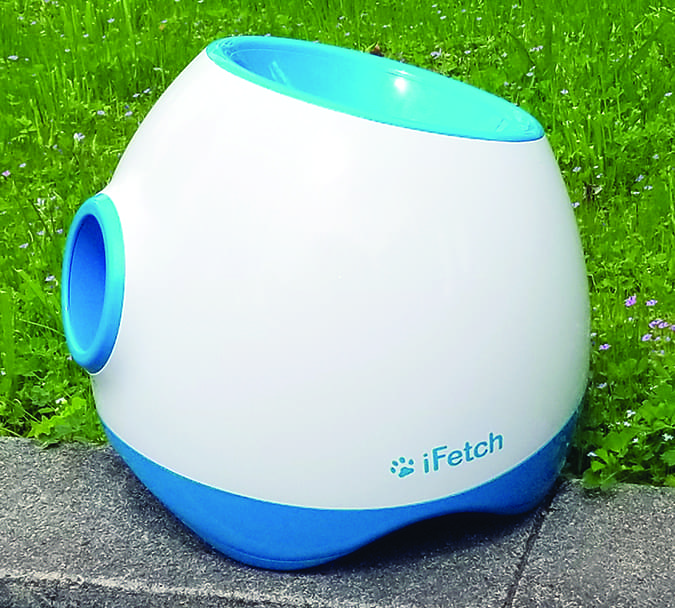
After spending days with the GoDogGo and the PetSafe ball launchers, both of which take a few moments and make noises as they prepare to launch a ball, the quick and quiet launching action of the iFetch actually startled us! When you or your dog drops a ball into the hopper, it almost instantaneously flings the ball out.
The iFetch Too has three distance settings – 10, 25, and 40 feet – and can be set to any of these, or set to cycle through these distances randomly. It’s also the only one of the three machines we tested that has an internal rechargeable battery. Its maker says the iFetch Too will launch a ball about 250 times on a full charge (or, of course, infinitely when plugged in).
The ball-launching mechanism of the iFetch seems like it would pose less of a danger to a curious dog nose or paw than that of the other products. The mechanism – comprised of a spinning plastic wheel on either side of the launch chute – moves only when a ball drops into the loading chute on the top, and only for as long as it takes for the ball to launch. The only way for a curious nose or paw to come into contact with a moving part would be if another dog was putting his nose or paw into the other opening at the exact same time – rather unlikely!
That said, an unwary dog or person who steps in front of the unit when a ball is dropped into the hopper could certainly get immediately smacked by the ball.
If it seems like we have way less to say about this product than the last one, it’s because, especially in contrast to the feature-laden GoDogGo Fetch Machine, the iFetch is an elegantly simple machine.
Our Least Favorite Automatic Ball Thrower: the PetSafe Automatic
There are two adjustment knobs on PetSafe’s Automatic Ball Launcher. One changes the distance of the ball’s launch, supposedly with nine possible settings, from about 8 feet to about 25 feet. One changes the angle of the launch, supposedly with six possible angle settings; these also affect the total distance that the launched ball will travel.
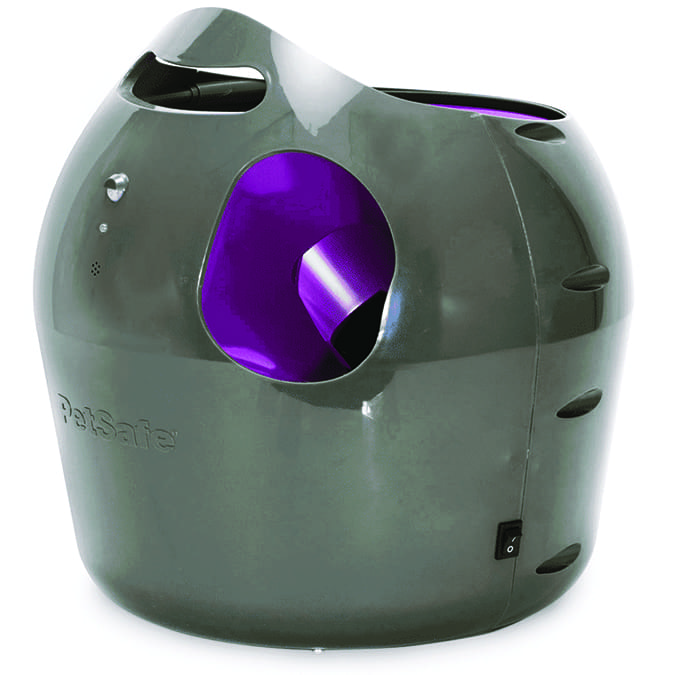
In our tests, only changes from one end of the angle settings to the other extreme were easy to observe; angle changes from adjusting the in-between settings were too subtle to appreciate. Likewise, small changes in the distance settings did not usually result in appreciable differences in the distance that the ball was launched, though a difference from one extreme to the other in the settings again was noticeable.
On the setting for the shorter distances, as many as three tennis balls can be placed into the hopper at once. However, according to the manual, on the higher distance settings, it’s best to put only one ball in the hopper at a time, as the balls in waiting may be knocked out of the machine by the launch of the first ball.
The Automatic Ball Launcher has several safety features. There is a motion sensor that is meant to prevent a launch when a dog or person is moving within 7 feet directly in front of the machine. However, we noticed that if a dog runs up to the machine and then stands still – as many fetch-addicted dogs are wont to do when waiting for a ball to be thrown – the machine will go ahead and launch.
There is also a safety sensor in the “launch pocket” (the chute that the ball is launched from); it detects if a dog has thrust his nose or paw into the chute in an effort to grab the ball before it is launched and it prevents the launch. Nice!
Another built-in safety feature is a programmed “rest mode,” which is intended to protect a dog from fetching to the point of exhaustion or overheating. The launcher will throw balls for only 15 minutes at a time, and then go into rest mode for 15 minutes before starting again. This can be overridden by a human operator (presumably only with good judgment as to the weather, the dog’s fitness, etc.), but (obviously) not by a dog who is left alone with the toy.
The launcher should not be used in wet conditions or on wet grass. For the dog’s safety, PetSafe also cautions against use in extreme hot or cold.
While the automatic ball launcher has the most safety features, it was the noisiest of the three machines, and launched balls the shortest distance. Lacking either the remote-controlled launch or loading capacity of the Fetch Machine, and without the rechargeable battery and quick, quiet launch of the iFetch, it’s just not as compelling as either competitor.
Low-Tech Ball Launchers
Maybe you don’t need an expensive machine to throw balls for your dog. Perhaps your dog isn’t such a fetch fanatic; you’re just looking for an easier way to launch a few balls.
Our recommendation in this case would be Nerf’s Tennis Ball Blaster. While grasping the trigger/handle of the shotgun-like Blaster, you can lower the opening of the “barrel” over a tennis ball that’s on the ground; this gesture scoops up or rather inserts the ball into the barrel (so you don’t have to pick up a spit-covered ball – but you can also just insert the ball into the end of the barrel with your hand). Then, slide the cocking mechanism on the top of the toy forward and back; the Blaster is then “loaded” and ready to launch when you pull the trigger.
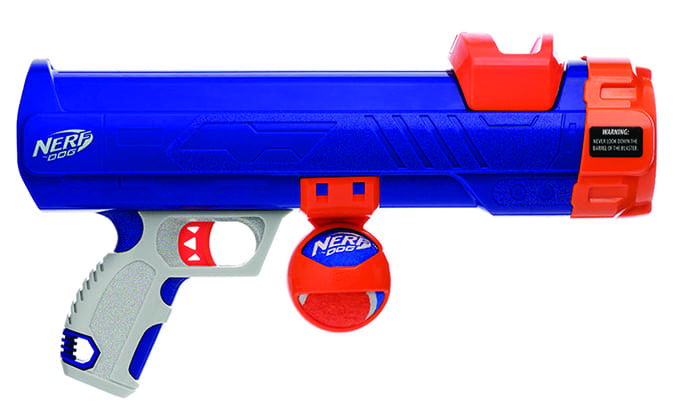
The full-sized Blaster (sometimes described as the “20-inch Blaster”) can shoot either standard-sized tennis balls or the small ones; just be warned that the big Blaster won’t pick up small balls off the ground (this is important only if you have trouble bending over and picking up balls from the ground).
The small-sized Blaster (called the “Tennis Ball Blaster with 3 Reload” on many online sites) comes with three small balls, but costs more than the large one. It picks up and launches only the small-sized balls – great for small dogs, but not safe for medium-sized or larger dogs (due to the risk of choking on or swallowing the small balls).
Not recommended:
One product we wouldn’t bother with is Hyper Pet’s K-9 Kannon. It, too, can be used to pick up standard-sized tennis balls off the ground, and will launch balls of either standard or small size.

But, in our opinion, the design is inherently unsafe and difficult to prepare to launch. To ready the Kannon, you draw back on the handle at the rear of the toy, stretching a thick rubber band (which powers the launch) out of the back of the Kannon. This requires a fair bit of strength! And if you are unable to draw it backward to its maximum distance, it won’t launch the ball far.
Worse, when you pull the trigger, the rubber band snaps back into the Kannon, launching the ball and – if you don’t hold the launcher just so – pinching you or whacking you with the handle as it launches the ball. This stretching/releasing of the rubber band outside of the body of the Kannon is just too hazardous to the handler for us to recommend this product.



